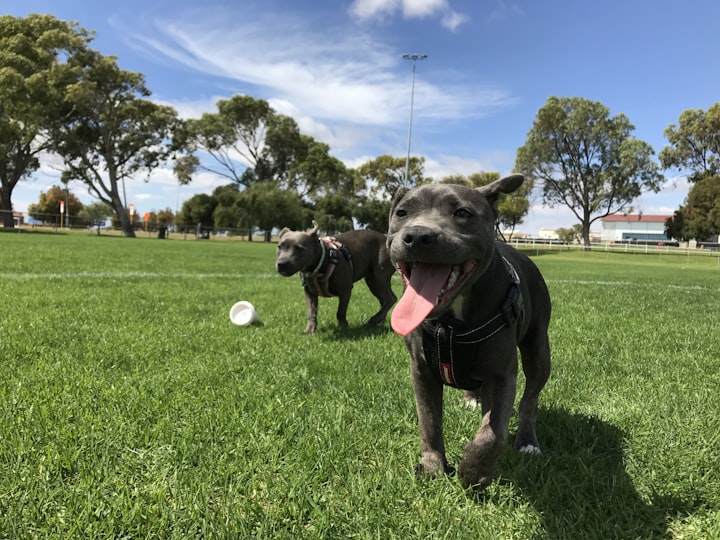Exploring the Pros and Cons of Dog Parks: A Guide to Successful Socialization
Navigating the Canine Playground: Tools and Strategies for a Positive Dog Park Experience

Dog parks serve as popular social hubs for canine companions and their owners, providing opportunities for exercise, socialization, and bonding. However, like any public space, dog parks have their own set of advantages and disadvantages. In this blog post, we will delve into the pros and cons of visiting a dog park, along with valuable tools and suggestions for successful socialization, addressing concerns such as handling problematic situations and determining appropriate off-leash time.
Pros of Dog Parks:
Socialization Opportunities: Dog parks offer a unique environment where dogs can interact with fellow canines, helping them develop essential social skills. Regular exposure to various breeds, sizes, and temperaments helps dogs become more well-rounded and comfortable around others.
Exercise and Energy Release: Visiting a dog park provides an excellent outlet for pent-up energy. Dogs can engage in free play, running, and fetching, helping them meet their exercise needs and reduce behavioral issues stemming from boredom and lack of physical activity.
Mental Stimulation: Dog parks stimulate dogs mentally as they encounter new scents, sounds, and sights. This mental stimulation is beneficial for their overall cognitive development, helping prevent boredom-related behavioral problems and fostering a happier disposition.
Community Building: Dog parks create opportunities for owners to connect and bond over their shared love for dogs. Building a network of fellow dog owners can lead to new friendships, support systems, and resources for dog-related advice and services.
Cons of Dog Parks:
Safety Concerns: While dog parks aim to provide a safe environment, there are inherent risks associated with large groups of unfamiliar dogs. Dogs with aggressive tendencies or poor social skills can potentially cause conflicts or injuries. Additionally, the presence of unvaccinated or unvaccinated dogs can pose health risks.
Lack of Control: Owners must relinquish a certain level of control when entering a dog park. Not all dogs may have reliable recall or obedience training, which can result in chaotic situations. Inexperienced or inattentive owners may struggle to manage their dogs effectively.
Disease Transmission: Dog parks can serve as breeding grounds for communicable diseases, such as kennel cough or parasites like fleas and ticks. Owners should ensure their dogs are up-to-date on vaccinations and use appropriate preventive measures to minimize the risk of disease transmission.
Tools and Suggestions for Successful Dog Park Visits:
Understanding Dog Behavior: Before visiting a dog park, familiarize yourself with canine body language and behavior. This knowledge will help you identify signs of stress, fear, or aggression in both your dog and others, allowing you to take appropriate action.
Supervision and Responsible Ownership: Maintain constant supervision of your dog to ensure their safety and to address any potential conflicts promptly. Be an attentive and responsible owner by picking up after your dog, preventing excessive barking, and intervening if necessary.
Gradual Introductions: When introducing your dog to the park, start by allowing them to observe from a distance. Gradually bring them closer, ensuring they remain calm and comfortable. This gradual approach minimizes stress and increases the likelihood of positive interactions.
Communication with Other Owners: Establish open communication with other dog owners in the park. Exchange information about your dog's behavior, health, and any concerns. This mutual understanding can help prevent misunderstandings and conflicts.
Identifying Problematic Dogs: If you observe aggressive or unsafe behavior from a specific dog, politely notify the owner of your concerns. It is important to address such issues promptly to maintain a safe environment for all dogs and owners.
Off-Leash Time: Determining when to allow your dog off-leash depends on several factors, including their recall reliability, level of training, and the park's rules. Ensure that your dog has a strong recall command before considering off-leash time. Start by practicing recall in a controlled and secure environment before transitioning to the dog park. Once you feel confident in your dog's obedience, gradually introduce off-leash time in designated areas within the park.
Know When to Leave: If your dog is displaying signs of stress, fear, or aggression, it may be time to leave the park. Pay attention to your dog's body language and behavior, and trust your instincts as a responsible owner. Additionally, if you encounter consistently problematic dogs or confrontational owners, it may be best to find an alternative park or visit during less crowded times.
Conclusion:
Dog parks offer numerous benefits for both dogs and owners, such as socialization, exercise, and mental stimulation. However, it is essential to be aware of the potential risks and challenges associated with these public spaces. By understanding dog behavior, practicing responsible ownership, and utilizing the suggested tools, you can navigate dog park visits successfully and provide a positive experience for both your dog and others. Remember, a well-socialized and well-exercised dog is a happy and healthy companion.
Learn more way to care for your dog Click Here Now!
About the Creator
Big Dog Shopping
Big Dog Shopping was created with the needs of big dog parents in mind. We understand the challenges of finding products that are suitable for larger breeds. We featuring only the highest quality products.





Comments
There are no comments for this story
Be the first to respond and start the conversation.